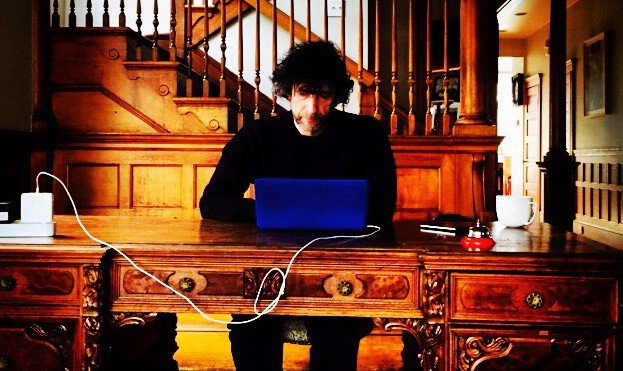
Boring Advice
Earlier this summer, the beloved writer Neil Gaiman was a guest on Late Night with Seth Meyers to promote The View from the Cheap Seats.
At one point in the interview, Meyers asked Gaiman about boredom. Here was Gaiman’s response:
“I think it’s about where ideas come from, they come from day dreaming, from drifting, that moment when you’re just sitting there…”
“The trouble with these days is that it’s really hard to get bored. I have 2.4 million people on Twitter who will entertain me at any moment…it’s really hard to get bored.”
What’s the solution? Gaiman adds:
“I’m much better at putting my phone away, going for boring walks, actually trying to find the space to get bored in. That’s what I’ve started saying to people who say ‘I want to be a writer,” I say ‘great, get bored.'”
Given that I have a chapter in my latest book titled Embrace Boredom, I was pleased to hear Gaiman’s advice.
I have definitely found it to be true in the creative pursuits that dominate my professional life. If I want to crack a proof or polish an important idea there’s really no substitute for hours and hours of just thinking.
The relationship is so linear that it’s almost (to reuse the word) boring. The more time I spend just walking and cogitating and being bored in a given season, the more I produce.
#####
A quick administrative note, Deep Work was nominated as one of the best non-fiction books of the year by the Goodreads Choice Awards. The winners will be selected by reader vote. If you’re a Goodreads member and like Deep Work, consider stopping by the nomination page to cast your vote for depth!

Thanks, I have just learned the course of which mentioned the thinking mode of the Focused and the Diffuse modes. Getting bored is an instance of the diffused modes which helps us a lot by unconscious.
I think it is an art of balancing a period of absorbing broad amounts of information and a period of letting the mind wander and make interesting connections. Twitter is very useful for getting different ideas from experts around the world. It’s only a problem if the person gets addicted to it and never makes time for wandering and writing.
On a different note, I read Deep Work. It’s great.
The defuse mode of thinking help us a lot.
As I stood in my kitchen waiting for the kettle during a break from writing my PhD it struck me that during all such breaks I scrolled through endless pages on social media. This means my brain never has a chance for any downtime during such an intense period of writing. I then started to recall Deep Work and then the timely email with this post appeared, reminding me that I really ought to commit to allowing my brain to be bored. As someone who struggles a great deal with focus and distractedness I am really glad this email came through to give me the jolt I so greatly needed, as I have been really struggling lately and haven’t felt I am able to get this PhD done. So thanks.
Not to be critical but I’m not sure if “bored” is the right word here. Think about the function of recess for elementary school children. It provides them the chance to switch gears and do something physical, like run around the school yard for a while, after which they will resume their intellectual work. Consider the possibilities for the kids who, upon hitting the playground, whip out their devices and live there until recess ends.
Hi Cal, I really loved your books! In “deep work” You are advising to get bored because that’s when insights, solutions arrive etc…
But then you wrote that you are using “productive meditation” while you go for walks, thus not allowing yourself to get bored (since you are thinking deeply about a problem). Isn’t that in opposition with “the attention restoration process” to think deeply about your problem and not letting your brain rest… Or are you actively separating both? (Productive meditation and attention restoration process)
Cal, can you add share buttons to you posts? For some reason I am not seeing one.
Nice advice. I’ll start reading this blog more often.
Smart phones are probably the most prevalent form of boredom relief and distraction. When mentoring junior colleagues, I call the smart phone the “dumb phone.” I tell them you will never finish writing a science paper if you don’t turn that thing off!
Interesting article, Cal. You might like Raising Nerd’s interview with Aaron Hillegass, who founded Big Nerd Ranch: https://raisingnerd.com/2016/10/17/raising-nerd-profile-computer-programmer/ …and this quote in particular: “I believe that children shouldn’t be entertained all the time; great things come from boredom.”
A lot of interesting points. There was one clarification to my thinking I wanted to quickly make: I tend to think of focused deep work as often being boring as well. That is, keeping your attention on something demanding — like a novelist staring at a blank page — can be “boring” in the sense that it lacks novel stimuli. So when I endorse boredom, I don’t just mean letting your mind wander into insight, but also to retain your attention on a fixed target even when numerous distractions pull it toward something more interesting,
Love the power of social media to help me find interesting blogs like this. Good advice from Neil. Boredom is undervalued but essential to creativity.
You do realise a blog is a form of social media. And without other social media your blog would struggle to find readers. Claiming no social media presence is a mere conceit.
You New York Times article is provocative. You dismiss social media as trivial. But that merely suggests you don’t know how to use it well or appreciate its true power and social value.
Best wishes
@HuwSayer